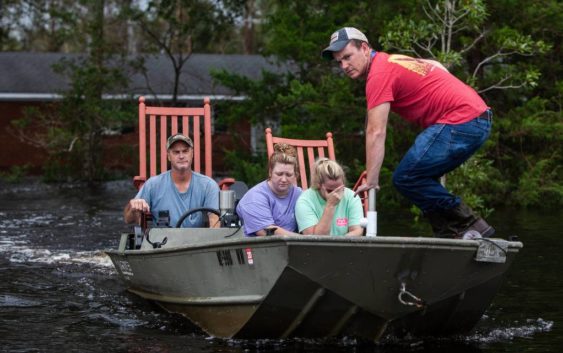- Artists transform hurricane aftermath into hoop-inspired masterpieces at Charlotte exhibit
- NC's cost for Hurricane Helene damage is nearly $60 billion, state says
- State to develop drone program to better respond to disasters like Helene, Florence
- South Carolina residents face deadline to get storm debris out to the curb after Hurricane Helene
- SCDOT to pick up Hurricane Helene debris for a final day in South Carolina
Hurricane Florence devastated the state. There are lessons to learn in the aftermath.

Aerial view captures impact of Florence flooding in New Bern
Commanding officers of the U.S. Coast Guard survey the flooding in New Bern, NC Saturday ,Sept. 15, 2018 to assess the impact of Hurricane Florence.
Commanding officers of the U.S. Coast Guard survey the flooding in New Bern, NC Saturday ,Sept. 15, 2018 to assess the impact of Hurricane Florence.
RALEIGH
The state is still recovering from Hurricane Florence, and the next hurricane season begins in June.
A volunteer force from IBM spent a month in North Carolina coming up with ideas to better coordinate emergency responses, donations and volunteers.
A dozen IBM volunteers from six countries — participants in the IBM Corporate Service Corps — talked to government officials, businesses, churches and volunteer organizations and helped with hands-on Florence recovery. They formally presented their ideas for improvements to the state on Friday.
“IBM stepped up in a big way,” said Kristi Jones, Gov. Roy Cooper’s chief of staff. “It’s not enough to get through the storm, you want to learn through the storm.”
Hurricane Florence, which hit the state in mid-September last year, and the resulting flooding damaged or destroyed thousands of homes in the state, and was responsible for more than three dozen deaths, The News & Observer has reported.
IBM workers said there’s a better way to track the donations that pour into the state after disasters and to get those items to people who need them.
The state relies heavily on volunteer organizations, with no set system for matching donations to disaster survivors, the IBM team said.
A solution would be Google-based web forms where volunteer organizations could make requests, donors could make offers, and organizations could register their warehouses so the state would know where to send goods.
“The result is fewer unmet needs,” said Ma Bernadette M. Saddul, an IBM systems administrator from the Philippines.
They also recommended tracking the work of volunteers who sign up on the state’s website and contacting them after their service to get feedback on their experiences.
Kartik Bal, a global information security manager from India, said 1,800 people offered to volunteer after Florence using the state’s website. The IBM team suggested getting feedback from volunteers, sending them thank you emails, and funneling the feedback to the organizations they worked for.
Increased social media presence would make more people aware of volunteer opportunities, the IBM team said. The requests for feedback and the thank you emails would make it more likely that volunteers will return to help after future emergencies.
In a news release, Cooper’s office said it would set up a group that will meet regularly to prepare for future disasters.